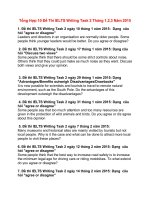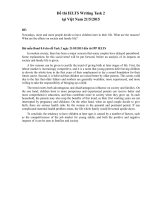IELTS writing task 2 ( example)
Bạn đang xem bản rút gọn của tài liệu. Xem và tải ngay bản đầy đủ của tài liệu tại đây (154.81 KB, 5 trang )
As English has become the dominant language worldwide, vast numbers of people are learning it.
The age of English-language acquisition is also lowering at the same time. Personally, I
believe it is essential for a person from a non-English speaking community to learn English,
but I think it is not necessary to do so until a child is around seven or eight.
Supporters of teaching English at kindergarten – that is, when a child is aged between two to five –
believe that early exposure will produce more competent speakers. Parents who are keen to
give their child a head start in an ever more competitive world are persuaded by this idea.
They think that if English is combined with play, it will be easily absorbed, and not seem
like study at all. However, there are strong arguments against teaching English at
kindergarten.
Firstly, linguists claim that a child needs to be literate in his or her own language before another is
begun unless that child is already living in a completely bilingual environment – that is: his
or her parents are native speakers of both languages, and both languages are used around
the child.
Secondly, kindergarten teachers are less likely to be native English speakers themselves, or to be
competent language teachers, which means that what children learn at kindergarten could
be no more than a smattering of words – ‘Hello’ ‘Goodbyes’, numbers, colours, and the
names of animals. All of these could be learnt very quickly in a school classroom at the age
of seven in addition to proper grammar and good pronunciation.
Then there is the issue that kindergartens provide ‘English’ more as a marketing tool than an
educational one, cashing in on concerned parents. It could also be a status symbol that a
child is learning English at the age of three among the friends of his or her parents, meaning
that the child’s learning experience is subordinated to the parents’ prestige.
In my view, kindergarten is a time to acquire social skills, motor skills, and a deeper understanding
of a child’s own language. English can come later when a child is more capable of focused
learning, and when the teaching is likely to be better. In an age where the endless pursuit of
qualifications and accomplishments seems the norm, why not let a child be a child at
kindergarten?
Traffic Problems Essay - Model Answer
Traffic congestion in many cities around the world is severe. One possible solution to this
problem is to impose heavy taxes on car drivers and use this money to make public
transport better. This essay will discuss the benefits and drawbacks of such a
measure.
One of the first benefits of such a measure is that the heavy taxes would discourage car
owners from using their cars because it would become very expensive to drive. This
would mean that they would begin to make use of public transport instead, thus
reducing traffic problems and pollution as well. Another benefit would be that much
more use would be made of public transport if it was improved. It is often the case
that public transport in cities is very poor. For example, we often see old buses and
trains that people would rather not use. High taxes would generate enough money to
make the necessary changes.
Nevertheless, there are drawbacks to such a solution. First and foremost, this would be a
heavy burden on the car drivers. At present, taxes are already high for a lot of people,
and so further taxes would only mean less money at the end of the month for most
people who may have no choice but to drive every day. In addition, this type of tax
would likely be set at a fixed amount. This would mean that it would hit those with
less money harder, whilst the rich could likely afford it. It is therefore not a fair tax.
To conclude, this solution is worth considering to improve the current situation, but there
are advantages and disadvantages of introducing such a policy.
(277 words)
Some of the methods used in advertising are unethical and unacceptable in today’s society.To what
extent do you agree with this view?
So your options are:
1. Agree 100%
2. Disagree 100%
3. Partly agree
In the answer below, the writer agrees 100% with the opinion.As you can see, the writers opinion is
made clear in the thesis statement (the last sentence of the introduction).All the body
paragraphs then explain why the writer disagrees. In other words, it discusses the negative
aspects of advertising.
Model Essay for IELTS
You should spend about 40 minutes on this task.
Write about the following topic:
Some of the methods used in advertising are unethical and unacceptable in today’s society.To
what extent do you agree with this view?Give reasons for your answer and include any
relevant examples from your own experience or knowledge.Write at least 250 words.
Essay for IELTS Model Answer
The world that we live in today is dominated by advertising. Adverts are on television, on the
World Wide Web, in the street and even on our mobile phones. However, many of the
strategies used to sell a product or service can be considered immoral or
unacceptable.
To begin with, the fact that we cannot escape from advertising is a significant cause for
complaint. Constant images and signs wherever we look can be very intrusive and
irritating at times. Take for example advertising on the mobile phone. With the latest
technology mobile companies are now able to send advertising messages via SMS to
consumers' phones whenever they choose. Although we expect adverts in numerous
situations, it now seems that there are very few places we can actually avoid them.
A further aspect of advertising that I would consider unethical is the way that it encourages
people to buy products they may not need or cannot afford. Children and young
people in particular are influenced by adverts showing the latest toys, clothing or
music and this can put enormous pressure on the parents to buy these products.
In addition, the advertising of tobacco products and alcohol has long been a controversial
issue, but cigarette adverts have only recently been banned in many countries. It is
quite possible that alcohol adverts encourage excessive consumption and underage
drinking, yet restrictions have not been placed on this type of advertising in the same
way as smoking.
It is certainly true to say that advertising is an everyday feature of our lives. Therefore,
people are constantly being encouraged to buy products or services that might be too
expensive, unnecessary or even unhealthy. In conclusion, many aspects of advertising
do appear to be morally wrong and are not acceptable in today's society.
(296 words)
Comments
This essay for IELTS is well organized as there are five clear paragraphs, each containing ideas that
are relevant, well expressed, and related to the topic.
Focusing on the language and structures in particular, the essay starts with an appropriate
introductory sentence. Linking words are used accurately (However, In addition, Therefore).
Phrases that signal opinions are evident (A further aspect of advertising that I would consider
unethical. ..) backed up by reasons (...encourages people to buy products they may not need or
cannot afford) and examples (Children and young people in particular, are influenced by
adverts).
In general, many other useful phrases are used, indicating a good control of language (It is quite
possible... Many people consider. .. It is certainly true to say.. .).
Comments
The topic is clearly stated in the general statement of the introduction, and the thesis tells the reader
that advantages and disadvantages will be discussed.
It is organized well, with the advantages of such a solution in the first body paragraph and the
disadvantages in the next.
Each paragraph has two ideas and they are well signaled and supported.
There are some good uses of tenses to show the writer is discussing the unreal future i.e. something
that has not happened (would discourage car owners..., would be a heavy burden...,).
We cannot help everyone in the world that needs help, so we should only be concerned with
our own communities and countries. To what extent do you agree or disagree with
this statement?
Some people believe that we should not help people in other countries as long as there are
problems in our own society. I disagree with this view because I believe that we should try
to help as many people as possible.
On the one hand, I accept that it is important to help our neighbors and fellow citizens. In
most communities there are people who are impoverished or disadvantaged in some way. It
is possible to find homeless people, for example, in even the wealthiest of cities, and for
those who are concerned about this problem, there are usually opportunities to volunteer
time or give money to support these people. In the UK, people can help in a variety of ways,
from donating clothing to serving free food in a soup kitchen. As the problems are on our
doorstep, and there are obvious ways to help, I can understand why some people feel that
we should prioritise local charity.
At the same time, I believe that we have an obligation to help those who live beyond our
national borders. In some countries the problems that people face are much more serious
than those in our own communities, and it is often even easier to help. For example, when
children are dying from curable diseases in African countries, governments and individuals
in richer countries can save lives simply by paying for vaccines that already exist. A small
donation to an international charity might have a much greater impact than helping in our
local area.
In conclusion, it is true that we cannot help everyone, but in my opinion national
boundaries should not stop us from helping those who are in need.
(280 words, band 9)
Vocabulary
• There are problems in our own society: có những vấn đề trong xã hội chúng ta
• help as many people as possible: giúp càng nhiều người càng tốt
• people who are impoverished or disadvantaged in some way: những người nghèo khổ hoặc
chịu thiệt thòi
• for those who are concerned about this problem: dành cho những người quan tâm về vấn đề
này
• volunteer time: dành thời gian làm việc tình nguyện
• from donating clothing to serving free food in a soup kitchen: từ quyên góp quần áo đến
phục vụ các bữa ăn miễn phí
• the problems are on our doorstep: những vấn đề hàng ngày của chúng ta
• In some countries the problems that people face are much more serious than those in our
own communities, and it is often even easier to help: Ở một số quốc có những vấn đề mà
người dân bản địa phải đối mặt nghiêm trọng hơn so với người dân của chúng ta, và nó thường
là dễ dàng hơn để giúp đỡ họ
• children are dying from curable diseases in African countries: nhiều trẻ em đang chết dần
vì những căn bệnh có thể chữa được tại các quốc gia châu Phi
• save lives simply by paying for vaccines that already exist: cứu sống các em bằng cách trả
tiền cho các loại vaccine cần thiết
• national boundaries should not stop us from helping those who are in need: biên giới quốc
gia không thể ngăn chúng ta giúp đỡ những người đang có nhu cầu cần được giúp đỡ









